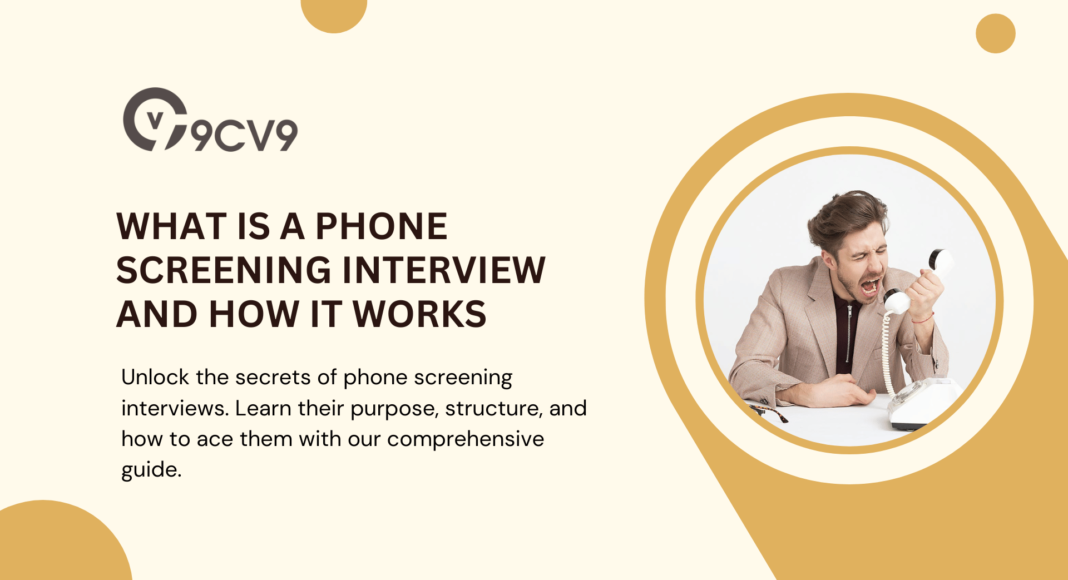Key Takeaways
- Master the art of phone screening interviews with insights into their purpose, structure, and evaluation criteria.
- Prepare effectively by understanding common interview questions, dos and don’ts, and strategies for overcoming challenges.
- Showcase your qualifications and enthusiasm while navigating phone screening interviews, setting the stage for success in the job search journey.
In the fast-paced world of job hunting, the initial steps can often feel like a labyrinth of uncertainty.
As you embark on your quest for the perfect career opportunity, you’ll undoubtedly encounter a crucial checkpoint along the way: the phone screening interview.

But what exactly is a phone screening interview, and why does it hold such significance in the hiring process?
Whether you’re a seasoned professional or a fresh-faced graduate taking your first steps into the job market, understanding the ins and outs of this pivotal stage can make all the difference between landing your dream job or being left in the lurch.
In this comprehensive guide, we’re delving deep into the realm of phone screening interviews, illuminating every aspect of their purpose, process, and potential pitfalls.
From demystifying the objectives behind these preliminary conversations to equipping you with invaluable tips and strategies for success, consider this your roadmap to navigating the often murky waters of phone screening interviews with confidence and finesse.
So, whether you’re gearing up for your very first phone screening interview or looking to sharpen your skills for future opportunities, join us as we embark on a journey to uncover the secrets of this essential step in the job search process.
By the time we’re through, you’ll be armed with the knowledge and insight needed to tackle phone screening interviews head-on, setting the stage for a successful career trajectory. Let’s dive in.
Before we venture further into this article, we like to share who we are and what we do.
About 9cv9
9cv9 is a business tech startup based in Singapore and Asia, with a strong presence all over the world.
With over eight years of startup and business experience, and being highly involved in connecting with thousands of companies and startups, the 9cv9 team has listed some important learning points in this overview of What is a Phone Screening Interview and How it Works.
If your company needs recruitment and headhunting services to hire top-quality employees, you can use 9cv9 headhunting and recruitment services to hire top talents and candidates. Find out more here, or send over an email to [email protected].
Or just post 1 free job posting here at 9cv9 Hiring Portal in under 10 minutes.
What is a Phone Screening Interview and How it Works
- Understanding Phone Screening Interviews
- Preparation Tips for Phone Screening Interviews
- How Phone Screening Interviews Work
- Dos and Don’ts of Phone Screening Interviews
- Common Phone Screening Interview Questions and How to Answer Them
- Overcoming Phone Screening Interview Challenges
1. Understanding Phone Screening Interviews
In the realm of modern recruitment, phone screening interviews serve as the vital first filter in the candidate selection process.
These preliminary conversations provide hiring managers with an opportunity to assess candidates’ qualifications, motivations, and cultural fit before committing to in-person meetings.

Let’s delve deeper into what makes phone screening interviews tick:
Definition and Purpose
- Definition: A phone screening interview is an initial conversation between a hiring manager or recruiter and a candidate conducted over the phone.
- Purpose:
- Evaluate Fit: Assess whether candidates meet the basic requirements for the role and align with the company’s culture.
- Screen for Red Flags: Identify any potential red flags or inconsistencies in the candidate’s resume or application.
- Time-saving: Efficiently narrow down the candidate pool before investing time and resources in face-to-face interviews.
Key Objectives for Employers
- Assess Communication Skills: Evaluate candidates’ ability to articulate their thoughts, convey enthusiasm, and engage in meaningful dialogue.
- Confirm Qualifications: Validate the information provided on the candidate’s resume and delve deeper into their relevant skills and experiences.
- Evaluate Cultural Fit: Gain insights into the candidate’s personality, work style, and values to determine compatibility with the company culture.
Benefits for Candidates
- Convenience: Phone screening interviews offer the convenience of conducting interviews from the comfort of your own space, eliminating the need for travel.
- Opportunity to Impress: Despite the lack of face-to-face interaction, candidates can still make a positive impression through their communication skills, professionalism, and preparedness.
- Initial Feedback: Receive initial feedback on your candidacy and gain insights into areas for improvement or further exploration.
Example: Imagine you’re applying for a marketing manager position at a renowned digital agency. The hiring manager conducts a phone screening interview to gauge your experience in digital marketing, your familiarity with relevant tools and platforms, and your ability to collaborate with cross-functional teams. By showcasing your expertise and enthusiasm for the role, you leave a lasting impression and advance to the next stage of the hiring process.
Understanding these fundamental aspects of phone screening interviews lays the groundwork for success, both for employers seeking top talent and candidates vying for coveted positions.
2. Preparation Tips for Phone Screening Interviews
Preparation is the cornerstone of success in any job interview, and phone screening interviews are no exception.

These preliminary conversations may be brief, but they require careful planning and attention to detail to make a lasting impression. Here’s how you can ensure you’re ready to shine:
Research the Company and the Role
- Company Background: Familiarize yourself with the company’s history, mission, values, and recent achievements.
- Job Description: Analyze the job description thoroughly to understand the key responsibilities, required qualifications, and desired skills.
- Industry Insights: Stay informed about industry trends, challenges, and opportunities relevant to the company and the role.
Example: Suppose you’re applying for a software engineering position at a tech startup known for its innovative products and agile development culture. Researching the company reveals its commitment to cutting-edge technologies and a collaborative work environment, which you can align with your own experiences and aspirations during the phone screening interview.
Review Common Interview Questions
- Behavioral Questions: Prepare responses to common behavioral questions that assess your past experiences, such as “Tell me about a time when you faced a challenging situation at work and how you resolved it.”
- Technical Questions: Brush up on technical concepts or skills relevant to the role, especially if you anticipate technical questions related to your field of expertise.
- Role-specific Questions: Anticipate questions tailored to the specific requirements of the job, such as your experience with specific software tools or your approach to project management.
Example: For a customer service representative position, you might encounter questions like “Can you describe a time when you successfully resolved a customer complaint?” or “How do you handle difficult customers?” By preparing relevant anecdotes and examples, you can demonstrate your problem-solving skills and customer-centric approach during the phone screening interview.
Practice Your Responses
- Mock Interviews: Conduct mock phone screening interviews with a friend, family member, or mentor to simulate the interview experience and receive feedback.
- Voice Modulation: Practice speaking clearly, confidently, and at a moderate pace to ensure your voice comes across effectively over the phone.
- Time Management: Practice delivering concise and focused responses within the typical time constraints of a phone screening interview.
Example: During a mock phone screening interview, you’re asked to “Walk me through your resume.” By practicing your response beforehand, you can succinctly highlight your key experiences, skills, and achievements, ensuring a compelling and coherent narrative that captures the interviewer’s attention.
Prepare Questions to Ask the Interviewer
- Clarify Expectations: Ask about the next steps in the hiring process, the timeline for decision-making, and any additional information needed from your end.
- Company Culture: Inquire about the company culture, team dynamics, and opportunities for professional development to assess fit beyond the job description.
- Role-specific Queries: Seek clarification on specific aspects of the role, such as the day-to-day responsibilities, performance expectations, or growth opportunities.
Example: You might ask the interviewer, “Can you tell me more about the team dynamics within the marketing department?” or “What are the company’s long-term goals for expanding its market presence?” By posing thoughtful questions, you demonstrate your genuine interest in the role and the company during the phone screening interview.
By following these preparation tips, you can approach phone screening interviews with confidence, clarity, and readiness to impress prospective employers.
3. How Phone Screening Interviews Work
Phone screening interviews serve as the initial gateway in the hiring process, allowing employers to assess candidates’ suitability for the role before committing to face-to-face meetings.
Understanding the mechanics of phone screening interviews can help candidates navigate the process with confidence and clarity.
Here’s a comprehensive breakdown of how these interviews typically unfold:
Scheduling and Logistics
- Initial Contact: After reviewing applications, recruiters or hiring managers reach out to selected candidates via email or phone to schedule a phone screening interview.
- Availability: Coordinate with the interviewer to find a mutually convenient time for the phone call, taking into account time zone differences and scheduling conflicts.
- Confirmation: Once the interview time is confirmed, ensure you have the necessary contact information, including the interviewer’s name, phone number, and any additional instructions for the call.
Example: You’ve applied for a marketing coordinator position at a global corporation. The recruiter contacts you via email to schedule a phone screening interview for the following week. After exchanging a few emails to finalize the details, you confirm the interview time and receive the interviewer’s contact information.
Duration and Format
- Typical Length: Phone screening interviews typically last between 15 to 30 minutes, though they may vary depending on the complexity of the role and the interviewer’s agenda.
- One-on-One: Most phone screening interviews are conducted as one-on-one conversations between the candidate and the interviewer, although there may be exceptions for panel interviews or multiple interviewers.
- Phone or Video: While traditional phone calls are common, some employers may opt for video conferencing platforms like Zoom or Skype for a more interactive experience.
Example: During a phone screening interview for a sales associate position, the hiring manager informs you that the interview will last approximately 20 minutes. They explain that it will be a one-on-one conversation conducted over the phone to discuss your sales experience and customer service skills.
Typical Structure of a Phone Screening Interview
- Introduction: The interviewer introduces themselves and provides a brief overview of the company and the role.
- Candidate Overview: The candidate is asked to provide a summary of their background, experience, and career goals.
- Questions and Discussion: The interviewer asks a series of predetermined questions to assess the candidate’s qualifications, skills, and fit for the role.
- Closing: The interviewer summarizes the key points discussed, provides information about the next steps in the hiring process, and invites the candidate to ask any questions.
Example: As the phone screening interview begins, the hiring manager introduces themselves as the head of the marketing department and provides a brief overview of the company’s recent marketing initiatives. They then ask you to introduce yourself, prompting you to highlight your marketing experience, relevant skills, and interest in the role. Throughout the conversation, the interviewer asks probing questions about your experience with digital marketing strategies and campaign management.
Evaluation Criteria Used by Employers
- Relevance to Role: Assessing whether the candidate’s skills, experiences, and qualifications align with the requirements of the role.
- Communication Skills: Evaluating the candidate’s ability to articulate their thoughts, actively listen, and engage in meaningful dialogue.
- Professionalism: Observing the candidate’s demeanor, attitude, and level of preparedness during the interview.
Example: In evaluating candidates for a customer service representative position, the hiring manager focuses on their ability to empathize with customers, resolve issues efficiently, and maintain a positive attitude under pressure. They pay close attention to candidates’ communication skills, noting their clarity of expression, active listening, and ability to handle hypothetical customer scenarios with professionalism and empathy.
Understanding how phone screening interviews work enables candidates to approach these interactions with confidence and clarity, setting the stage for success in the hiring process.
4. Dos and Don’ts of Phone Screening Interviews
Navigating a phone screening interview requires finesse and attention to detail.
To make a positive impression and advance to the next stage of the hiring process, it’s essential to adhere to certain dos and avoid common pitfalls.
Here’s a comprehensive guide to dos and don’ts for phone screening interviews:
Dos:
- Maintain Professionalism:
- Speak in a professional tone and avoid using slang or overly casual language.
- Demonstrate enthusiasm and interest in the role and company.
- Treat the phone screening interview with the same level of seriousness as an in-person interview.
- Speak Clearly and Confidently:
- Enunciate your words clearly to ensure the interviewer can understand you.
- Project confidence in your voice and avoid sounding hesitant or unsure.
- Take pauses between sentences to allow the interviewer to digest your responses.
- Listen Actively:
- Listen attentively to the interviewer’s questions and prompts.
- Ask for clarification if you don’t understand a question or need more information.
- Demonstrate your understanding by paraphrasing or summarizing the interviewer’s points before responding.
Don’ts:
- Multitask During the Call:
- Avoid distractions such as checking emails, browsing the internet, or engaging in other tasks during the interview.
- Give the interviewer your full attention to ensure you’re actively engaged in the conversation.
- Find a quiet and distraction-free environment for the duration of the interview.
- Speak Negatively About Previous Employers:
- Refrain from criticizing or speaking negatively about your previous employers, colleagues, or work experiences.
- Focus on highlighting positive aspects of your past roles and experiences, even if they were challenging.
- Frame any negative experiences as learning opportunities or growth moments.
- Forget to Follow Up After the Interview:
- Send a thank-you email to the interviewer within 24 hours of the phone screening interview.
- Express gratitude for the opportunity to discuss the role and reiterate your interest in the position.
- Use the follow-up email as an opportunity to address any additional points or questions that arose during the interview.
Example: Imagine you’re interviewing for a remote software development position. During the phone screening interview, you maintain a professional demeanor, speaking clearly and confidently about your technical skills and past projects. You actively listen to the interviewer’s questions and provide thoughtful responses, demonstrating your understanding of the role’s requirements. After the interview, you send a personalized thank-you email expressing your appreciation for the opportunity and reiterating your enthusiasm for the position.
By adhering to these dos and avoiding common pitfalls, you can make a positive impression during phone screening interviews and increase your chances of moving forward in the hiring process.
5. Common Phone Screening Interview Questions and How to Answer Them
Phone screening interviews often include a set of standard questions designed to assess candidates’ qualifications, experiences, and fit for the role.
Being prepared with thoughtful and concise responses can help candidates navigate these questions with confidence.
Here’s a detailed guide to common phone screening interview questions and strategies for answering them effectively:
Tell me about yourself.
- Keep it Brief and Relevant:
- Provide a concise overview of your professional background, highlighting relevant experiences, skills, and achievements.
- Tailor your response to emphasize aspects of your background that align with the requirements of the role.
- Focus on Career Trajectory:
- Discuss your career progression and how each experience has contributed to your skills and expertise.
- Highlight key milestones or accomplishments that demonstrate your qualifications for the position.
Example: “I have a background in marketing with over five years of experience in digital marketing agencies. I started my career as a marketing assistant, where I gained hands-on experience in social media management and content creation. Over the years, I’ve progressed to roles with increasing responsibility, leading cross-functional teams and implementing successful digital marketing campaigns. I’m particularly passionate about data-driven strategies and leveraging analytics to optimize campaign performance.”
What are your strengths and weaknesses?
- Highlight Relevant Strengths:
- Identify strengths that are directly applicable to the role and emphasize how they would benefit the employer.
- Provide specific examples or anecdotes to illustrate your strengths in action.
- Address Weaknesses Positively:
- Acknowledge areas where you have room for improvement but frame them as opportunities for growth.
- Discuss steps you’ve taken to address or mitigate your weaknesses, such as professional development or seeking feedback.
Example: “My strengths include strong analytical skills, attention to detail, and the ability to collaborate effectively with cross-functional teams. For example, in my previous role, I led a project to revamp our email marketing strategy, resulting in a 20% increase in open rates. As for weaknesses, I sometimes struggle with public speaking, but I’ve been actively working on improving my presentation skills by attending workshops and seeking feedback from mentors.”
Why are you interested in this position?
- Showcase Alignment with Company and Role:
- Demonstrate your understanding of the company’s mission, values, and industry position.
- Explain how the role aligns with your career goals and aspirations.
- Highlight Unique Aspects of the Opportunity:
- Discuss specific aspects of the position, such as the opportunity for professional growth, the company’s innovative projects, or the potential to make an impact.
Example: “I’m excited about the opportunity to join [Company Name] because of its reputation for innovation and commitment to [specific industry or value]. I’ve been following the company’s recent initiatives, such as [mention recent project or achievement], and I’m impressed by its impact on the industry. Additionally, I’m drawn to this role because it allows me to leverage my skills in [relevant skill or experience], while also providing opportunities for further growth and development.”
Describe a challenge you’ve overcome at work.
- Focus on Problem-Solving Skills:
- Choose a challenge that demonstrates your ability to overcome obstacles and achieve positive outcomes.
- Outline the steps you took to address the challenge, including any innovative or creative solutions you implemented.
- Emphasize Collaboration and Adaptability:
- Highlight how you worked collaboratively with colleagues or stakeholders to overcome the challenge.
- Discuss how you adapted to changing circumstances or learned from the experience to improve your approach in the future.
Example: “In my previous role, we faced a significant budget cut that required us to rethink our marketing strategy. Instead of scaling back on initiatives, I collaborated with the team to identify cost-effective alternatives. We implemented a content repurposing strategy that allowed us to maximize the impact of our existing assets across multiple channels. Through close collaboration with our design and content teams, we were able to maintain our marketing efforts within the reduced budget while still achieving our campaign objectives.”
By preparing thoughtful responses to these common phone screening interview questions, candidates can effectively showcase their qualifications and suitability for the role, increasing their chances of moving forward in the hiring process.
6. Overcoming Phone Screening Interview Challenges
Phone screening interviews come with their own set of challenges, from technical glitches to nervousness and unexpected questions.

However, with preparation and the right mindset, candidates can navigate these challenges effectively.
Here’s a comprehensive guide to overcoming common phone screening interview challenges:
Dealing with Technical Issues
- Test Equipment in Advance:
- Ensure your phone or computer, internet connection, and any necessary software or applications are working properly before the interview.
- Conduct a test call with a friend or family member to check audio quality and connectivity.
- Have Backup Options:
- Keep a backup phone or alternative communication method (e.g., Skype or Zoom) in case of technical difficulties.
- Have the interviewer’s contact information readily available in case you need to reschedule or troubleshoot.
Managing Nervousness and Anxiety
- Practice Relaxation Techniques:
- Practice deep breathing exercises or mindfulness techniques to calm your nerves before the interview.
- Visualize yourself succeeding in the interview and focus on positive outcomes.
- Prepare Thoroughly:
- Thorough preparation can boost your confidence and alleviate anxiety. Review common interview questions, research the company, and practice your responses.
Handling Unexpected Questions or Scenarios
- Stay Calm and Collected:
- If faced with unexpected questions, take a moment to gather your thoughts before responding.
- Don’t be afraid to ask for clarification if you’re unsure about the question or scenario.
- Focus on Transferable Skills:
- Even if you encounter questions outside your immediate expertise, focus on highlighting transferable skills and experiences that are relevant to the role.
Example: Imagine you’re in the middle of a phone screening interview when your internet connection suddenly drops. Instead of panicking, you quickly switch to your mobile phone and dial back into the call using your cellular network. You apologize for the interruption and seamlessly pick up where you left off, demonstrating your adaptability and problem-solving skills to the interviewer.
Ensuring Clear Communication
- Speak Clearly and Slowly:
- Enunciate your words clearly and avoid speaking too quickly, especially if the connection quality is poor.
- Take pauses between sentences to ensure the interviewer can follow along.
- Active Listening:
- Listen attentively to the interviewer’s questions and prompts to ensure you understand them correctly.
- Paraphrase or summarize the interviewer’s points before responding to demonstrate your understanding.
Demonstrating Enthusiasm and Engagement
- Use Vocal Cues:
- Use vocal cues such as tone variation and inflection to convey enthusiasm and engagement.
- Smile while speaking, as it can positively impact your tone and demeanor.
- Ask Thoughtful Questions:
- Engage with the interviewer by asking thoughtful questions about the role, company culture, or team dynamics.
- Show genuine interest in the opportunity and convey your enthusiasm for the position.
Example: During a phone screening interview for a sales role, you encounter a question about a hypothetical sales scenario that you hadn’t prepared for. Instead of stumbling over your words, you take a moment to gather your thoughts and respond confidently, drawing on your past experiences and problem-solving skills to provide a thoughtful answer. Your ability to think on your feet and maintain composure impresses the interviewer, highlighting your suitability for the role.
By proactively addressing potential challenges and equipping yourself with strategies to overcome them, you can approach phone screening interviews with confidence and resilience, maximizing your chances of success in the hiring process.
Conclusion
Phone screening interviews serve as the crucial first step in the journey toward securing your dream job.
By now, you’ve gained a comprehensive understanding of what phone screening interviews entail and how they operate. From preparation tips to dos and don’ts, and strategies for overcoming challenges, you’re equipped with the knowledge and skills needed to excel in these preliminary conversations.
Throughout this guide, we’ve explored the intricacies of phone screening interviews, shedding light on their purpose, structure, and evaluation criteria.
We’ve delved into the importance of thorough preparation, effective communication, and maintaining professionalism to make a positive impression on interviewers.
Now armed with insights into common interview questions and strategies for crafting compelling responses, you’re ready to tackle any curveball thrown your way during a phone screening interview.
Whether it’s articulating your strengths, addressing weaknesses positively, or demonstrating enthusiasm for the role, you have the tools to navigate these interactions with confidence and finesse.
Remember, phone screening interviews are not just about showcasing your qualifications and experiences; they’re also an opportunity to assess the company culture, team dynamics, and alignment with your career goals.
By approaching these interviews with curiosity, enthusiasm, and authenticity, you can glean valuable insights into whether the role and company are the right fit for you.
As you embark on your job search journey, keep in mind that each phone screening interview is a stepping stone toward your ultimate career aspirations.
Embrace the process, learn from each experience, and continue to refine your interview skills along the way.
With diligence, preparation, and a positive mindset, you’re well-positioned to ace your next phone screening interview and move one step closer to landing the job of your dreams.
So, pick up the phone with confidence, and let your skills and personality shine through as you navigate the exciting world of phone screening interviews.
Good luck.
If your company needs HR, hiring, or corporate services, you can use 9cv9 hiring and recruitment services. Book a consultation slot here, or send over an email to [email protected].
If you find this article useful, why not share it with your hiring manager and C-level suite friends and also leave a nice comment below?
We, at the 9cv9 Research Team, strive to bring the latest and most meaningful data, guides, and statistics to your doorstep.
To get access to top-quality guides, click over to 9cv9 Blog.
People Also Ask
What is a phone screening interview?
A phone screening interview is an initial conversation between a candidate and a recruiter or hiring manager to assess qualifications and suitability for a job role.
Why do companies conduct phone screening interviews?
Phone screenings help companies evaluate candidates efficiently, narrowing down the applicant pool and identifying top candidates for further consideration.
How long does a phone screening interview typically last?
Phone screening interviews typically last between 15 to 30 minutes, although this can vary depending on the role and the interviewer’s agenda.
What are the objectives of a phone screening interview?
The objectives include assessing candidate qualifications, confirming information provided on the resume, evaluating communication skills, and determining cultural fit.
What should I expect during a phone screening interview?
Expect questions about your background, experience, skills, and interest in the role. The interviewer may also provide information about the company and the next steps in the hiring process.
How should I prepare for a phone screening interview?
Research the company, review the job description, practice common interview questions, and ensure you have a quiet and distraction-free environment for the call.
What are some common phone screening interview questions?
Common questions include “Tell me about yourself,” “What are your strengths and weaknesses,” “Why are you interested in this position,” and “Describe a challenge you’ve overcome at work.”
How should I answer the “Tell me about yourself” question?
Provide a concise overview of your professional background, highlighting relevant experiences, skills, and achievements.
What are recruiters looking for in phone screening interviews?
Recruiters are looking for candidates who meet the basic requirements for the role, communicate effectively, demonstrate enthusiasm, and show alignment with the company culture.
How can I make a good impression during a phone screening interview?
Speak clearly and confidently, listen actively, ask thoughtful questions, and express genuine interest in the role and company.
How can I handle technical issues during a phone screening interview?
Test your equipment in advance, have backup options available, and communicate proactively with the interviewer if any technical issues arise.
What should I do if I don’t understand a question during the interview?
Ask the interviewer to clarify the question or provide more information to ensure you fully understand what is being asked.
Is it okay to take notes during a phone screening interview?
Yes, taking notes can help you remember key points and questions to ask later in the interview. Just be sure not to let note-taking distract you from actively engaging in the conversation.
What should I do if I get nervous during the interview?
Practice relaxation techniques beforehand, take deep breaths, and remind yourself of your qualifications and preparation to boost your confidence.
How can I demonstrate my interest in the role and company?
Research the company beforehand, ask thoughtful questions about the role and company culture, and provide specific examples of why you’re excited about the opportunity.
What should I do if I’m asked a question I don’t know the answer to?
Be honest about your limitations, but try to relate the question to your experience or skills. You can also express your willingness to learn and adapt to new challenges.
How can I follow up after a phone screening interview?
Send a thank-you email to the interviewer within 24 hours, expressing appreciation for the opportunity and reiterating your interest in the position.
What should I do if I don’t hear back after a phone screening interview?
Follow up with the interviewer or recruiter after a reasonable amount of time has passed to inquire about the status of your application and express continued interest in the role.
How many phone screening interviews should I expect to have?
It depends on the company’s hiring process, but candidates typically go through one or two phone screening interviews before progressing to in-person interviews.
Can a phone screening interview lead to a job offer?
While rare, it’s possible for a candidate to receive a job offer directly following a phone screening interview if they exceed expectations and meet all the requirements for the role.
What should I do if the interviewer doesn’t call me at the scheduled time?
Wait for a few minutes in case the interviewer is running late, then reach out to them via email or phone to inquire about the status of the interview.
How can I make sure my voice comes across effectively over the phone?
Speak clearly and at a moderate pace, enunciate your words, and avoid mumbling or speaking too softly.
Should I dress up for a phone screening interview?
While you don’t need to dress formally for a phone screening interview, dressing professionally can help you feel more confident and put-together during the call.
How can I demonstrate my enthusiasm over the phone?
Use vocal cues such as tone variation and inflection to convey enthusiasm and engagement, and express your interest in the role and company.
What if I have a noisy background during the interview?
Find a quiet and distraction-free environment for the call, such as a closed room or a quiet corner, and inform household members or roommates of the interview in advance.
Can I ask about salary and benefits during a phone screening interview?
It’s generally best to wait until later stages of the hiring process to discuss salary and benefits, unless the interviewer brings it up first.
How can I maintain focus during a phone screening interview?
Eliminate distractions such as phones, pets, or other people in the room, and actively engage in the conversation by listening attentively and asking questions.
Is it okay to take breaks during a phone screening interview?
While it’s best to avoid taking breaks during the interview, if you need to step away briefly, inform the interviewer beforehand and keep it as brief as possible.































![Writing A Good CV [6 Tips To Improve Your CV] 6 Tips To Improve Your CV](https://blog.9cv9.com/wp-content/uploads/2020/06/2020-06-02-2-100x70.png)


